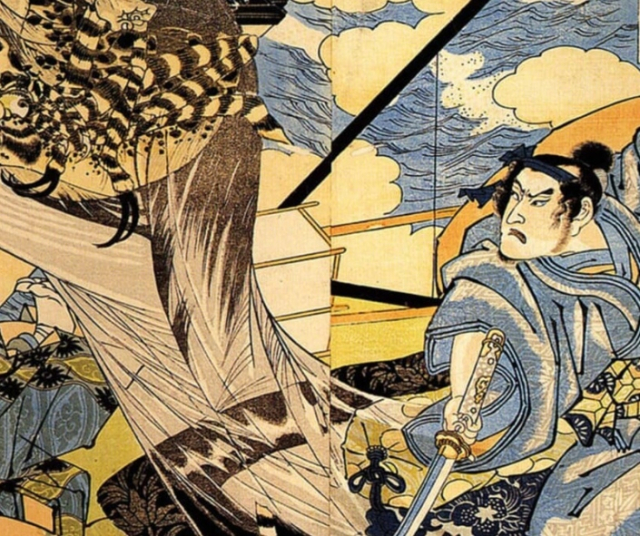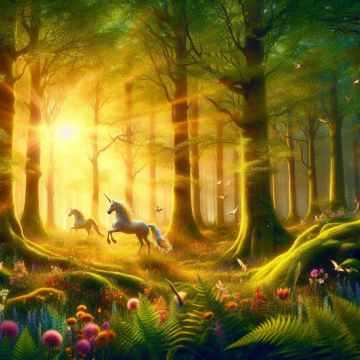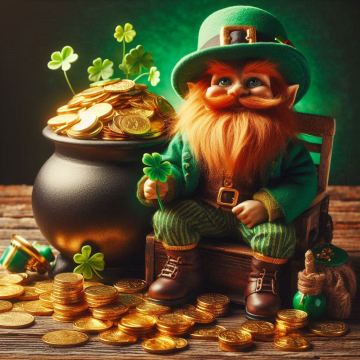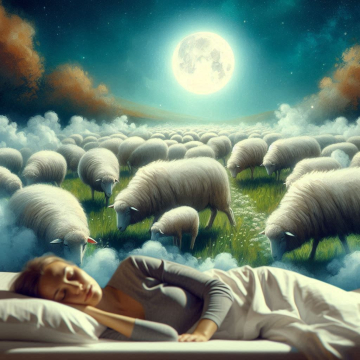All about Japanese mythology

Japanese mythology is a rich tapestry of beliefs and traditions that has evolved over millennia, shaping the culture and identity of the Japanese people. From its ancient gods and goddesses to legends of heroes and monsters, Japanese mythology offers a unique insight into the spiritual world and worldview of the Land of the Rising Sun.
Origins and Foundations of Japanese mythology.
The origins of Japanese mythology date back to prehistoric times, before Japan was a unified nation. Japan's early religion was influenced by the animistic and shamanistic beliefs of the islands' first inhabitants, who worshiped nature spirits and revered their ancestors.
Over time, these beliefs merged with those imported from China and Korea, giving rise to a more structured belief system that incorporated elements of Buddhism, Taoism, and Confucianism. Japanese mythology was further enriched by the arrival of Buddhism in the 6th century, which peacefully coexisted with native traditions and contributed to the formation of a rich religious syncretism.
Gods and spirits: The diversity of the Japanese pantheon.
The Japanese pantheon is populated by a wide variety of gods and spirits, each with their own personality, attributes, and dominion over specific aspects of the natural and human world. Among the most important gods are:
- Amaterasu: The sun goddess and divine ancestor of the Japanese imperial lineage.
- Susanoo: The god of the sea and storms, known for his impetuous character and his confrontations with his sister Amaterasu.
- Tsukuyomi: The moon god, brother of Amaterasu and Susanoo, whose domain includes night and time.
- Inari: The god of rice, agriculture and prosperity, revered as one of the main gods of fertility and abundance.
- Raijin and Fujin: The gods of thunder and wind, respectively, whose powers influence weather and natural phenomena.
In addition to the main gods, Japanese mythology is also populated by a wide range of spirits and supernatural creatures, known as yokai, who inhabit forests, mountains, rivers and other natural places.
Legends and myths: Narratives of heroes and monsters.
The legends and myths of Japanese mythology are full of exciting narratives that have been passed down through generations, enriching the culture and identity of the Japanese people. These stories not only entertain, but also transmit values, moral teachings and reflections on human nature and the universe. Among these narratives, the stories of brave heroes and fearsome monsters that have left an indelible mark on the Japanese collective imagination stand out.
One of the best-known legends in Japanese mythology is that of Momotaro, or "The Peach Boy." According to the story, Momotaro was born from a giant peach floating down the river and was found by an old couple. Upon opening the peach, they discovered the child inside and raised him as their own son. As Momotaro grew up, he revealed himself to be an exceptionally brave and determined child. He decided to embark on a journey to defeat the demons that were terrorizing the region. Along his way, he made friends with several animals: a dog, a monkey and a pheasant, who helped him on his mission. Together, Momotaro and his friends fought against the demons and managed to defeat them, returning peace and prosperity to the region.
Another popular story is that of Urashima Taro, a fisherman who rescues a turtle trapped in a net and releases it back into the sea. In gratitude, the turtle takes Urashima Taro to the Dragon King's palace at the bottom of the ocean. There, Urashima Taro spends what he thinks are three days, but upon returning to the surface, he discovers that three hundred years have passed in the human world. This story is an example of how time can be perceived differently in the divine and earthly realms, and also serves as a warning about excessive curiosity and desire for the unknown.
Another fundamental aspect of Japanese mythology is the Yokai, supernatural creatures that live in forests, mountains, rivers and other natural places. Yokai can be both benevolent and evil, and their appearance and behavior vary widely. Some Yokai are protectors of nature and travelers, while others are mischievous or even dangerous. Among the best-known Yokai are the Kitsune (fox), which can change shape and has magical powers; the Tengu, a mountain spirit with a long nose and martial skills; and the Kappa, a turtle-like aquatic demon that can cause trouble for humans who venture near its habitats.
One of the most fascinating legends in Japanese mythology is that of Yamata no Orochi, an eight-headed, eight-tailed serpent monster that terrorized the Izumo region. According to legend, the hero Susanoo, the god of the sea and storms, faced Orochi to free the princess Kushinada-hime, whom the monster was holding captive. With the help of an old man named Tadatomo, Susanoo planned a ploy to intoxicate Orochi with sake (rice wine) and cut off their heads while he slept. After a fierce battle, Susanoo triumphed over Orochi and freed the princess, becoming a hero revered for his bravery and cunning.
The legacy of Japanese mythology: Influences on culture and society.
Japanese mythology has left a deep mark on the country's culture and society, influencing areas as diverse as art, literature, music, cinema and religion. Themes and motifs from Japanese mythology are found in classic literary works such as Hayao Miyazaki's "The Tale of the Bamboo Cutter" and "Spirited Away."
Additionally, Japanese mythology remains an integral part of the country's religious holidays and traditions, such as the Obon Festival and Shogatsu (New Year), which include rituals and ceremonies dedicated to revered gods and spirits.
Japanese mythology is a treasure trove of stories and beliefs that continue to inspire and enrich Japanese culture today. Through its gods, heroes and legends, Japanese mythology offers a unique window into Japan's rich spiritual and cultural heritage, inviting everyone to explore and appreciate its vast richness and diversity.
ARTICLES

How do gifts strengthen relationships?
Gifts are much more than simple material objects; They are expressions of love, generosity, gratitude and celebration that enrich our relationships.

The impact of love on life
From romantic and family relationships to friendships and social connections, love has various forms and expressions.

Magical Creatures: Unicorns
Throughout the centuries, unicorns have continued to capture the imagination and admiration of people of all ages and cultures.

Magical creatures: The elves
Elves are creatures from European mythology, whose origins date back to the ancient beliefs and superstitions of Celtic and Germanic cultures.

The meaning of dreaming about ducks
Dreaming about ducks is an experience rich in symbolism, which can provide valuable clues about our psyche and our everyday experiences.

What does it mean to dream about sheep?
Dreaming about sheep is an intriguing phenomenon that can have a variety of meanings and interpretations, depending on the context of the dream.